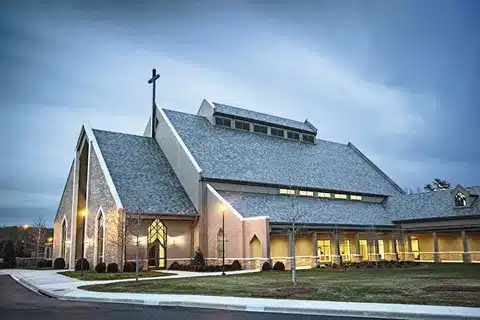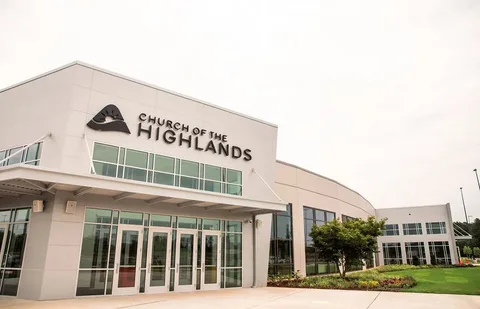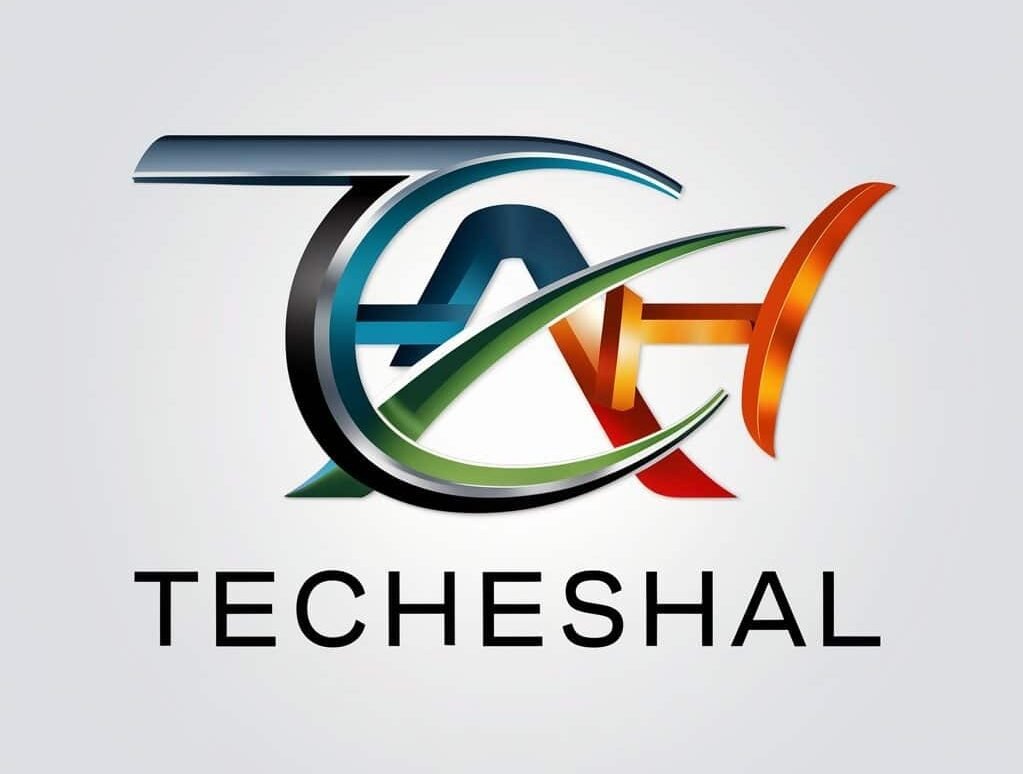The Church of the Highlands (COH) in Alabama is a behemoth in the megachurch world, boasting tens of thousands of weekly attendees. But with its immense popularity comes whispers of controversy. This article dives deeper, exploring the inner workings of COH and the issues that have sparked public discussions.
From Humble Beginnings to Mountaintop Campuses
Founded in 1998 by Pastor Chris Hodges, The Church of the Highlands started small. However, its focus on contemporary worship, engaging messages, and a community-oriented approach fueled rapid growth. Today, COH boasts multiple campuses across Alabama, attracting congregants with its modern facilities, energetic services, and an array of programs for all ages.
Also Read: Conquering Your Exams with Next Exam Tak: Your One-Stop Guide to Exam Success
The Promises of The Church of the Highlands: Faith, Family, and Fun
The Church of the Highlands emphasizes a welcoming atmosphere. Their services are lively, incorporating contemporary music and dynamic presentations. The church heavily promotes family involvement, offering dedicated children’s programs, youth groups, and activities for married couples. COH even extends its reach beyond Sundays, hosting social events, concerts, and community outreach initiatives, fostering a strong sense of belonging among its members.
The Shadow of Controversy: Handling Allegations
Despite its outward image, COH has faced criticism regarding its handling of sensitive issues. Several former staff members have come forward with allegations of mishandled sexual misconduct complaints. Critics point to instances where accused pastors were allegedly given a second chance within the church after facing accusations, raising concerns about the church’s commitment to victim safety. These incidents have sparked discussions about transparency and accountability within the church’s leadership.
Financial Prosperity and Public Scrutiny
The Church of the Highlands’s financial success has also drawn scrutiny. The megachurch’s vast resources fund its expansive campuses, polished productions, and various ministries. However, some question the allocation of funds, particularly when considering the allegations of mishandled misconduct cases.

The Theology of COH: Traditional with a Modern Twist
Theologically, COH identifies as a non-denominational evangelical church. They adhere to core Christian beliefs centered on the Bible, salvation through Jesus Christ, and living a Christ-centered life. However, COH presents these messages in a contemporary way, utilizing modern technology and relatable illustrations to connect with a wider audience.
Also Read: Unveiling the Mystery: A Deep Dive into WellHealth Organic Buffalo Milk
The Power of Social Media: Likes and Dislikes in the Public Eye
Social media has become a double-edged sword for COH. While it allows them to connect with a geographically dispersed audience, it also amplifies controversies. For instance, instances where Pastor Hodges’ social media activity has raised eyebrows regarding social issues have sparked public debates and criticism.
Leaving the Flock: Why Some Walk Away
While The Church of the Highlands thrives on a loyal following, some former members have chosen to leave. Reasons for departure vary, with some citing disagreements with the church’s teachings or practices. Others express disillusionment with the handling of controversies or a feeling of being pressured to conform to a certain lifestyle.
Is The Church of the Highlands Right for You? Weighing the Issues
Ultimately, deciding whether COH aligns with your personal faith journey is a decision for you. If considering membership, research the church’s teachings, leadership, and approach to sensitive topics. It’s crucial to feel comfortable with the church’s environment and confident that your values align with theirs.
The Church of the Highlands: A Complex Tapestry
The Church of the Highlands is a multifaceted entity. It offers a vibrant faith community, engaging services, and a strong emphasis on family. However, controversies regarding leadership and finances cast a shadow. Whether COH resonates with you hinges on your individual values and how you navigate the complexities it presents.
Beyond the Headlines: A Critical Look at COH’s Practices
The information we’ve explored so far paints a broad picture, but a deeper dive into COH’s practices reveals further complexities. Here are some key aspects to consider:
Leadership Structure and Hierarchy
Church of the Highlands operates under a centralized leadership model with Senior Pastor Chris Hodges at the helm. Critics argue that this concentration of power creates a system less susceptible to checks and balances. They call for a more decentralized structure with oversight committees to ensure accountability.
Volunteer Culture and Expectations
Church of the Highlands relies heavily on volunteers to run its extensive ministries and programs. While volunteering offers valuable service opportunities, some former members have expressed concerns about feeling pressured to dedicate an overwhelming amount of time to church activities. Finding a healthy balance between church involvement and personal life is crucial.
Teachings on Prosperity and Stewardship
Church of the Highlands emphasizes the importance of giving, encouraging members to tithe (donating 10% of their income) and participate in offerings. While financial stewardship is a core Christian principle, some critics argue that COH’s emphasis on giving can border on manipulation, placing undue pressure on members, particularly those facing financial difficulties.
The Role of Technology and Entertainment
Church of the Highlands skillfully utilizes technology and entertainment elements to create engaging services. However, some argue that the focus on high-production value and modern music can overshadow the essence of worship. Finding a balance between creative expression and a reverent atmosphere is an ongoing challenge for contemporary churches.

Is There Reform on the Horizon?
Following controversies, the Church of the Highlands has taken some steps to address concerns. They’ve implemented a reporting system for handling misconduct allegations and partnered with outside organizations for training on sensitive issues. However, critics argue that these measures haven’t gone far enough. Increased transparency regarding the handling of complaints and a more open dialogue with the congregation are crucial steps towards rebuilding trust.
Also Read: The Private and Powerful Life of Andrew Weissmann: A Look Beyond the Prosecutor
Finding Your Faith Community: Alternatives to Consider
If COH’s structure or practices don’t resonate with you, fret not. The Christian landscape offers a diverse range of denominations and church communities. Here are some factors to consider when searching for a faith home:
Denominational Affiliation: Explore established denominations like Methodist, Baptist, or Lutheran, each with its own theological distinctives.
Church Size and Style: Consider if a megachurch environment suits you or if a smaller, more intimate church setting feels more comfortable.
Focus on Specific Ministries: Maybe you prioritize a church with strong youth programs, a vibrant music ministry, or a focus on social justice initiatives.
The Importance of Critical Thinking and Open Dialogue
Ultimately, a healthy faith journey involves critical thinking and open dialogue. Don’t be afraid to ask questions, research different churches, and find a community that aligns with your beliefs and values. Open communication within churches is vital to ensuring transparency, accountability, and a welcoming environment for all.
Conclusion: The Future of COH
The Church of the Highlands remains a powerful force in American Christianity. Its future hinges on its ability to address internal challenges and navigate the complexities of modern society. Openness to feedback, a commitment to transparency, and a focus on core Christian values will be instrumental in shaping COH’s path forward.
FAQ: Church of the Highlands
Q: What are the core beliefs of COH?
A: COH identifies as a non-denominational evangelical church. They hold core Christian beliefs centered on the Bible, salvation through Jesus Christ, and living a Christ-centered life. However, they present these messages in a contemporary way.
Q: Is COH right for me?
A: This is a personal decision. Research COH’s teachings, leadership, and approach to sensitive topics. Be sure you feel comfortable with the environment and their values align with yours.
Q: What are the controversies surrounding COH?
A: Criticisms include handling of alleged misconduct, financial practices, and social media activity by leadership.
Q: Does COH have a strong emphasis on giving?
A: Yes, COH encourages tithing and offerings. While financial stewardship is important, some find the emphasis on giving overwhelming.
Q: What are some alternatives to COH?
A: Explore denominations like Methodist, Baptist, or Lutheran. Consider church size, style, and specific ministry focus.
Q: How can I find a good-faith community?
A: Research different churches, considering denominational affiliation, size, and ministry focus. Ask questions, visit different churches, and find a community that aligns with your beliefs.









